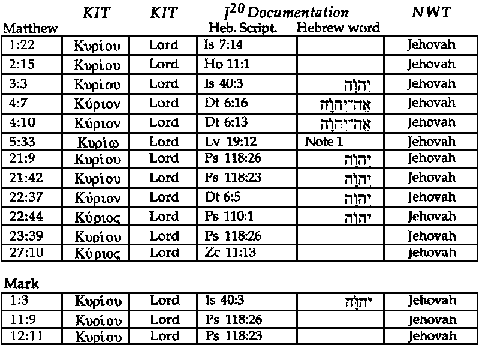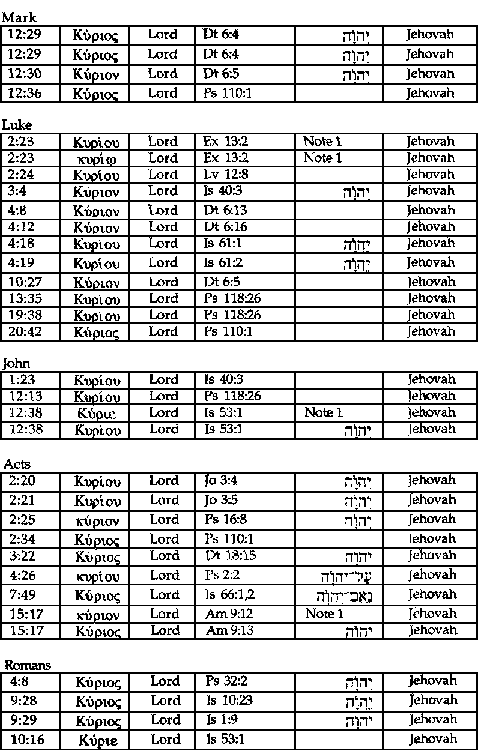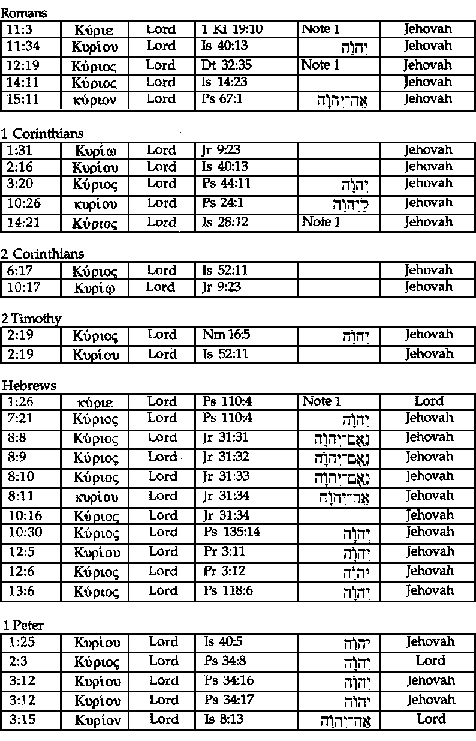
| Home | Chapter Index | Appendix Index | Complete on-line NWT |
A Concordance to the Greek Testament by W. F. Moulton and A. S. Geden (4th ed., Edinburgh, 1963) is identified in the Kingdom Interlinear Translation as "J" reference J20. (See Appendix A for a further description.) This reference is used by the New World Translation because it identifies Hebrew Scripture quotations from the Hebrew Scriptures.
Two categories of Hebrew Scripture references are cited. First, and most importantly, are those instances which are substantiated with a Hebrew Scripture reference which uses the Tetragrammaton. In these cases, the entry in the Concordance quotes the passage from the Hebrew Scriptures. In the following tables, we have included both the divine name as it appears in the Concordance entry and the Scripture reference. (Notice that the entries use vowel points and are consequently written h/:hy] rather than יהוה.)
In the second category of references, only the verse is cited without the quotation appearing from the Hebrew Scriptures. In this case, we have included only the reference, and the column containing the divine name will be blank.
J20 lists all of the Kyrios references contained in Appendix C. In this appendix, however, only the entries which cite a Hebrew Scripture reference are given. (J20 cites no Hebrew Scripture references for 2 Peter, any of John's Epistles, Jude, or the book of the Revelation.)
This is a definitive reference in our study of the Tetragrammaton in the Greek Scriptures. J20 precisely identifies each instance in the Greek Scriptures in which there is specific Hebrew Scripture use of the Tetragrammaton in the passage quoted in the Christian Greek Scripture. We have not included the references which contain Jah from Hallelujah (of which there are only four in the Greek Scriptures, all in Revelation). That is, only the 44 occurrences of h/:hy] as found in this reference would clearly fulfill the criteria of the New World Translation when they state (Reference Edition, Appendix 1D):
To know where the divine name was replaced by the Greek words Κύριος and θεός, we have determined where the inspired Christian writers have quoted verses, passages and expressions from the Hebrew Scriptures and then we have referred back to the Hebrew text to ascertain whether the divine name appears there. In this way we determined the identity to give Ky'ri.os and The.os' and the personality with which to clothe them.
To avoid overstepping the bounds of a translator into the field of exegesis, we have been most cautious about rendering the divine name in the Christian Greek Scriptures, always carefully considering the Hebrew Scriptures as a background. We have looked for agreement from the Hebrew versions to confirm our rendering. Thus, out of the 237 times that we have rendered the divine name in the body of our translation, there is only one instance [1 Co 7:17] where we have no agreement from the Hebrew versions. (Emphasis ours.)
Notice that, according to this source quoted by the translators of the New World Translation, only 42 Jehovah renderings are supported by the Hebrew Scriptures. (The number could be as many as 50 including the 42 יהוה and 8 other names of God cited as "Note 1.") This leaves the remaining 191 (or 183) to be supported by much later Hebrew versions.
Because the material from Appendix B was taken from an English source (The New World Translation), verse references may differ from the present list.
The reader should pay particular attention to the entries for 1 Peter 2:3 and 3:15.



[1] Note 1: Other Hebrew entry; this entry does not include יהוה.